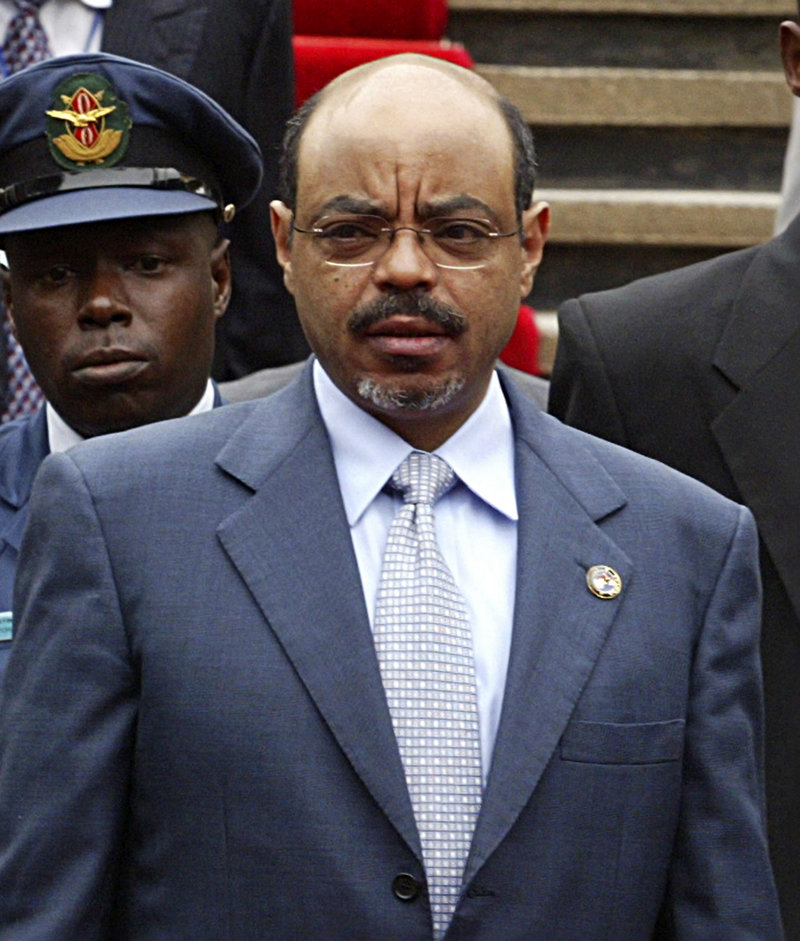ADDIS ABABA, Ethiopia — Meles Zenawi, Ethiopia’s longtime ruler and a major U.S. counter-terrorism ally who is credited with economic gains but blamed for human rights abuses, died of an undisclosed illness after not being seen in his East African country for weeks, Ethiopian authorities said Tuesday. He was 57.
Meles died in a Belgian hospital Monday just before midnight after contracting an infection, authorities said.
Hailemariam Desalegn, who was appointed deputy prime minister and minister of foreign affairs in 2010, became acting prime minister and will be sworn in as prime minister after an emergency meeting of parliament, said Bereket Simon, the communications minister. Parliament is controlled by Meles’ ruling party and governing coalition, ensuring Hailemariam will be approved. No new elections will be held, Bereket said.
The death is not likely to have an impact on the strong U.S. diplomatic and military relations with Ethiopia, given the hand-picked nature of the transition of power.
A European Union spokesman said Meles died in Brussels. He was expected to return to Ethiopia but a sudden complication reversed what had been a good recovery, Bereket said.
State TV on Tuesday showed pictures of Meles as classical music played in the background. Simon called the death shocking and devastating and the country’s council of ministers declared a national day of mourning.
On Tuesday afternoon in Belgium, an Associated Press television crew saw a car containing a casket being driven from Saint Luc Hospital in Brussels. After stopping to pick up personnel at the Ethiopian Embassy, the car drove to a private airfield where an Ethiopian plane waited on the tarmac. Meles’ body was expected in Ethiopia on Tuesday.
Opponents of Meles accuse him of killing and jailing opposition members and of rigging elections. Ethiopia’s Somalia community in particular has suffered under Meles, who won his last election in 2010 with a reported 99 percent of the vote.
Reaffirming the U.S. commitment to Ethiopia, President Barack Obama said Meles deserved recognition for his contributions to his country’s development, including “his unyielding commitment to Ethiopia’s poor.” But Obama also encouraged Ethiopia to enhance its support for democracy and human rights.
Born on May 8, 1955, Meles became president in 1991 after helping to oust Mengistu Haile Mariam’s Communist military junta, which was responsible for hundreds of thousands of Ethiopian deaths. Meles became prime minister in 1995, a position that is both the head of the federal government and armed forces.
The U.S. has long viewed Meles as a strong security partner and has given hundreds of millions of dollars in aid over the years. U.S. military drones that patrol East Africa – especially over Somalia – are stationed in Ethiopia. The U.S. goal for Somalia – a stable government free of radical Islamists – is in line with Ethiopia’s hopes.
Though a U.S. ally, Ethiopia has long been criticized by human rights groups for the government’s strict control, and Meles’ legacy is likely to be mixed: positive on the economic development side and negative on the human rights side.
Send questions/comments to the editors.



Success. Please wait for the page to reload. If the page does not reload within 5 seconds, please refresh the page.
Enter your email and password to access comments.
Hi, to comment on stories you must . This profile is in addition to your subscription and website login.
Already have a commenting profile? .
Invalid username/password.
Please check your email to confirm and complete your registration.
Only subscribers are eligible to post comments. Please subscribe or login first for digital access. Here’s why.
Use the form below to reset your password. When you've submitted your account email, we will send an email with a reset code.